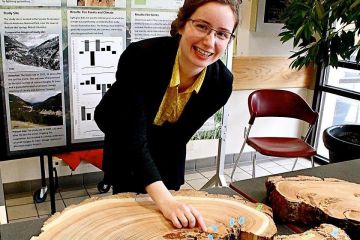IDEAFEST 2012: The Arab Spring: A season, or much more?
- Tyler Laing

The uprisings that flared up throughout the Middle East a year ago—events known as The Arab Spring—have not only altered the political landscape of that region, they have had an impact on the entire world. This was the topic of discussion for an IDEAFEST panel of UVic scholars on March 8. The Arab Spring One Year Later: Revolution, Resolution and Resentment public forum was not just about examining transformations of the past year, however, it was also about considering possible scenarios for the future.
More than 200 people attended the discussion, which was sponsored by the Centre for Studies in Religion and Society (CSRS). The panelists spoke for roughly half an hour before moderator Paul Bramadat opened the floor to audience questions. Bramadat, CSRS director and moderator of the event, set the tone by admitting that things had not quite unfolded the way he, and many others, had anticipated. He spoke of the hope felt around the world as the Arab Spring had initially grown in force and accomplishment—how it was believed these revolutions would change the Middle East for the better and be a shining example for other nations—but how these expectations had not yet, perhaps, come to fruition.
Martin Bunton, from the Department of History, talked about the Arab world in transition. He offered up an explanation for why permanent change had not been quite so quick to take hold. “We need to be patient,” he said. “Revolutions don’t happen in a season, a year, a decade—sometimes they don’t happen at all.” He added, “It was a revolutionary year in that the possibility of a revolution has opened up.”
Bunton went on to mention the positive role social media played during this time and how it helped establish “one’s place” within these events. People who possibly had felt like they had no voice before suddenly had an opportunity to share what they felt and what they saw. This fostered a sense of identity within the people.
The Department of Sociology’s Peyman Vahabzadeh, who questioned why a revolution has yet to take hold in Iran, touched on another issue that could eventually be seen as a positive in this whole ordeal—the “great role of Iranian women” in pushing for change. He was quick to add, however, that those women are currently underrepresented in the political scheme. He spoke of all the women activists who are in jail, or who have been jailed and released, and how this is now silencing them. The oppression of these dissidents prevents pockets of opposition from gaining strength, and as he noted, “the supreme leader wants a weak, fractured parliament that’s easy to control.”
Jason Colby, another member of the Department of History, looked at the US and global power in light of action in the Middle East, particularly that of Iran. He touched on US relations with countries in that region and how the Americans could unite with them to help infiltrate Iran. One of his reasons for why the US has not become involved in the goings-on is due to their “ambivalence to revolutions other than their own.”
Hanny Hilmy, also of the Department of History, discussed Islamic parties in post-Mubarek Egypt. He outlined the various parties and their political and religious stances, claiming that one of the problems Egypt still faces, even with Mubarek having been removed from power, is that the country still has the same police and military forces in place as it did under Mubarek. Even if a dictator is defeated, change will be hard to come by without a subsequent overhaul of the existing power structure, and that is something many of these countries are coming to realize.
After listening to his colleagues, the Department of History and Political Science’s Andrew Wender, spoke about religious sectarianism in Syria. In light of Hilmy’s point, and in reference to the unrest that still lingers in the Middle East, he predicted that “the end will be neither easy, nor quiet.” He expected more time and more difficulty before rewards could be realized.
Bunton agreed that change would take more time because “people aren’t used to life without dictatorship. Don’t think of this as an Arab Spring, think of this as an Arab Decade,” said Bunton. “Let’s come back in 10 years and then talk about this then.”
Photos
In this story
Keywords: ideaFest
People: Martin Bunton





